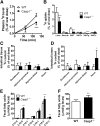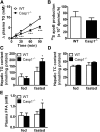Caspase-1 deficiency in mice reduces intestinal triglyceride absorption and hepatic triglyceride secretion
- PMID: 23160218
- PMCID: PMC3588871
- DOI: 10.1194/jlr.M031963
Caspase-1 deficiency in mice reduces intestinal triglyceride absorption and hepatic triglyceride secretion
Abstract
Caspase-1 is known to activate the proinflammatory cytokines IL-1β and IL-18. Additionally, it can cleave other substrates, including proteins involved in metabolism. Recently, we showed that caspase-1 deficiency in mice strongly reduces high-fat diet-induced weight gain, at least partly caused by an increased energy production. Increased feces secretion by caspase-1-deficient mice suggests that lipid malabsorption possibly further reduces adipose tissue mass. In this study we investigated whether caspase-1 plays a role in triglyceride-(TG)-rich lipoprotein metabolism using caspase-1-deficient and wild-type mice. Caspase-1 deficiency reduced the postprandial TG response to an oral lipid load, whereas TG-derived fatty acid (FA) uptake by peripheral tissues was not affected, demonstrated by unaltered kinetics of [(3)H]TG-labeled very low-density lipoprotein (VLDL)-like emulsion particles. An oral gavage of [(3)H]TG-containing olive oil revealed that caspase-1 deficiency reduced TG absorption and subsequent uptake of TG-derived FA in liver, muscle, and adipose tissue. Similarly, despite an elevated hepatic TG content, caspase-1 deficiency reduced hepatic VLDL-TG production. Intestinal and hepatic gene expression analysis revealed that caspase-1 deficiency did not affect FA oxidation or FA uptake but rather reduced intracellular FA transport, thereby limiting lipid availability for the assembly and secretion of TG-rich lipoproteins. The current study reveals a novel function for caspase-1, or caspase-1-cleaved substrates, in controlling intestinal TG absorption and hepatic TG secretion.
Figures




References
-
- Trayhurn P., Wood I. S. 2005. Signalling role of adipose tissue: adipokines and inflammation in obesity. Biochem. Soc. Trans. 33: 1078–1081 - PubMed
-
- He F., Doucet J. A., Stephens J. M. 2008. Caspase-mediated degradation of PPARgamma proteins in adipocytes. Obesity (Silver Spring). 16: 1735–1741 - PubMed
Publication types
MeSH terms
Substances
LinkOut - more resources
Full Text Sources
Other Literature Sources
Molecular Biology Databases
Miscellaneous

